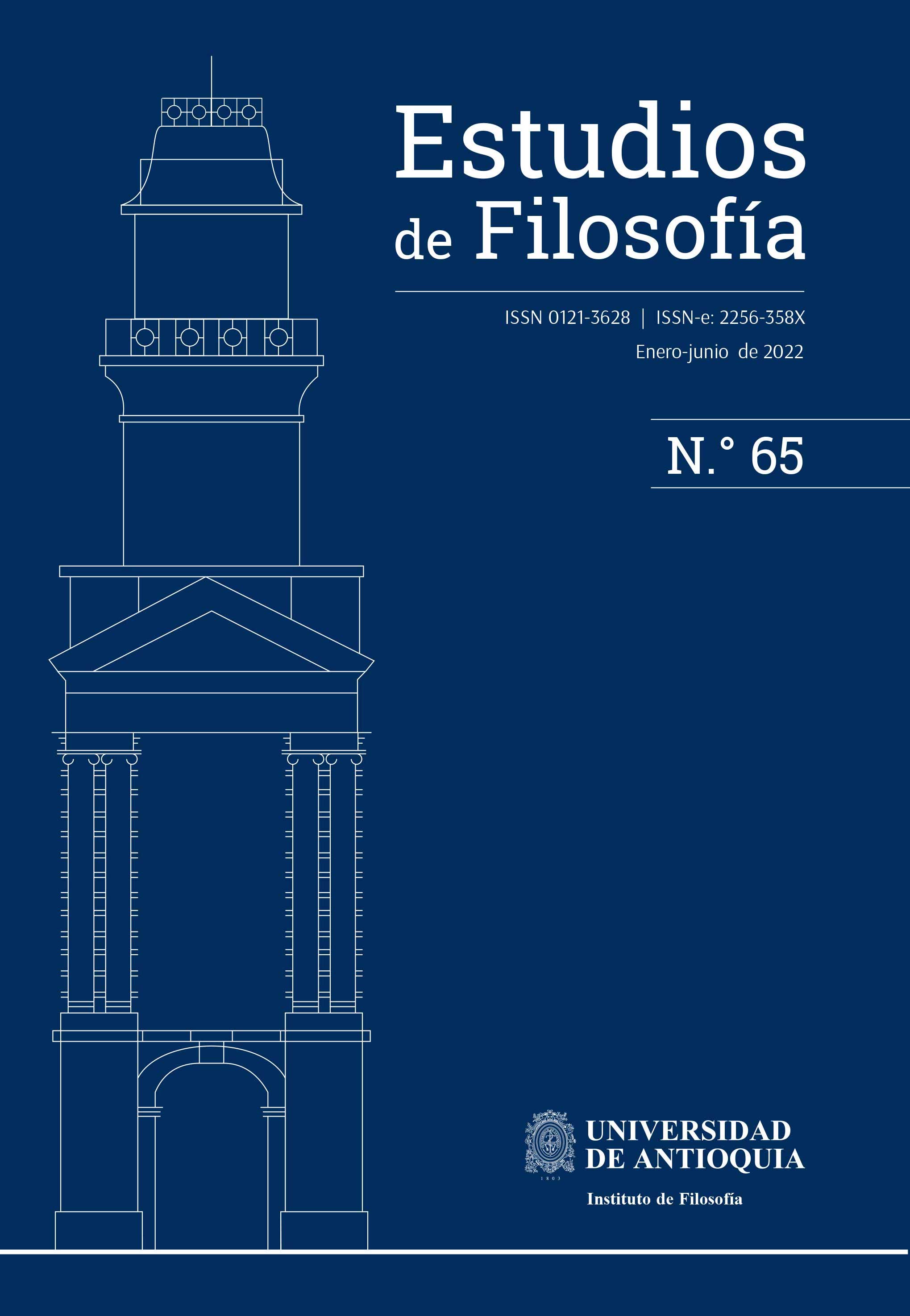Deleuze’s reading of the Critique of Pure Reason
DOI:
https://doi.org/10.17533/udea.ef.343613Keywords:
Deleuze, Kant, sensus communis logicus, pre-stablished harmony, agreementAbstract
The aim of this paper is to provide an analysis of Gilles Deleuze’s interpreta- tion of the Critique of Pure Reason such as it appears in his 1963 monographic work La Philosophie critique de Kant. We will show that the originality of Deleuze’s reading lies in reading the critical project in retrospect, taking the sensus communis problem from the Critique of the Power of Judgment and applying it to the first Critique. In so doing, he points out the survival of a pre-established harmony, now interiorized, both between heterogeneous faculties and between the matter of phenomena and the Ideas of reason. This implies a reinterpretation of the critical project that has passed unnoticed within Kantian studies and that places the Third Critique as the ground of the previous ones, unveiling common sense as a condition of possibility of knowledge.
Downloads
References
Allison, H. (1983). Kant’s transcendental idealism. An interpretation and defense. Yale University Press.
Allison, H. (2001). Kant’s theory of taste. A reading of the critique of aesthetic judgment. Cambridge University Press.
Borges, J. L. (1957). El escritor argentino y la tradición. En Discusión (pp. 151-163). Emecé. Deleuze, G. (1968). Différence et répétition. PUF.
Deleuze, G. (1990). Lettre à un critique sévère. En Pourparlers (pp. 11-23). Minuit.
Deleuze, G. (1993). Sur quatre formules poétiques qui pourraient résumer la philosophie
kantienne. En Critique et clinique (pp. 40-49). Minuit.
Deleuze, G. (2002a [1963]). L’idée de genèse dans l’esthétique de Kant. En L’île déserte. Textes
et entretiens 1953-1974 (pp. 79-101). Minuit.
Deleuze, G. (2002b [1967]). La méthode de dramatisation. En L’île déserte. Textes et entretiens 1953-1974 (pp. 131-162). Minuit.
Deleuze, G. (2003 [1990]). Lettre-Préface à Jean-Clet Martin. En Deux régimes de fous. Textes et entretiens (1975-1995) (pp. 338-340). Minuit.
Deleuze, G. (2005 [1963]). La philosophie critique de Kant. PUF.
Deleuze, G. (2008). Kant y el tiempo. Cactus.
Dotti, J. E. (1986). La distinción kantiana entre juicios de percepción y de experiencia, Revista de Filosofía y Teoría Política, 26-27, 239-242.
Gueroult, M. (1930). L’évolution et la structure de la Doctrine de la Science chez Fichte. Les belles lettres.
Guyer, P. (1997). Kant and the claims of taste. Cambridge University Press.
Hegel, G. W. F. (1971). Vorlesungen über die Geschichte der Philosophie III. Suhrkamp.
Heidegger, M. (2010). Gesamtausgabe. I. Abteilung: Veröffentliche Schriften 1914-1976. Band 3. Kant und das problem der metaphysik. Vittorio Klostermann.
Kant, I. (1846). Critique du jugement (Barni J., Trad.). Librairie Philosophique de Ladrange. Kant, I. (1968). Kants werke. Akademie Textausgabe (Königlich Preußischen Akademie der
Wissenschaften). De Gruyter.
Kant, I. (2009). Crítica de la razón pura (Caimi M., Trad.). Colihue.
Kerslake, C. (2009). Immanence and the vertigo of philosophy: from Kant to Deleuze. Edinburgh University Press. https://doi.org/10.3366/edinburgh/9780748635900.001.0001
Maimon, S. (2004 [1790]). Versuch über die Transzendentalphilosophie. Felix Meiner Verlag. https://doi.org/10.28937/978-3-7873-2078-3
Nehring, R. (2010). Kritik des common sense: gesunder menschenverstand, reflektierende urteilskraft und gemeinsinn – der sensus communis bei Kant. Duncker & Humblot. https://doi.org/10.3790/978-3-428-53161-5
Pirni, A. (2015). Hacia una Crítica de la razón armónica. CON-TEXTOS KANTIANOS, 2, 20-31.
Sánchez Rodríguez, M. (2012). Pequeñas percepciones e Ilustración en Leibniz y Kant. Una revisión de la intepretación deleuziana de Leibniz. Revista de Filosofía de la Universidad de Costa Rica, 51, 281-289.
Storrie, S. (2013). Kant’s 1768 attack on Leibniz’ conception of space. Kant-Studien, 104(2), 145–166. https://doi.org/10.1515/kant-2013-0011
Tocornal, G. R. (2010). Kant contra el leibnizianismo: El principio de sucesión y el problema del cambio en la Nova Dilucidatio de 1755. Tópicos, 39, 77-104.
Villinger, R. (2017). Recovering the ‘True Meaning’ of the Pre-Established Harmony: On a Neglected Key to Kant’s Theory of Intuition. Kant-Studien, 108(3), 338–377. https:// doi.org/10.1515/kant-2017-0030
Vuillemin, J. (1954). L’héritage kantienne et la révolution copernicienne. PUF.
Westphal, K. R. (1997). Affinity, idealism and naturalism: the stability of cinnabar and the possibility of experience. Kant-Studien, 88(2), 139-189. https://doi.org/10.1515/ kant.1997.88.2.139
Zhouhuang, Z. (2016). Der sensus communis bei Kant. Zwischen erkenntnis, moralität und schönheit. De Gruyter. https://doi.org/10.1515/9783110451917
Published
How to Cite
Issue
Section
Categories
License
Copyright (c) 2021 Pablo Pachilla

This work is licensed under a Creative Commons Attribution-NonCommercial-ShareAlike 4.0 International License.
Authors who publish with this journal agree to the following terms:
1. The Author retains copyright in the Work, where the term "Work" shall include all digital objects that may result in subsequent electronic publication or distribution.
2. Upon acceptance of the Work, the author shall grant to the Publisher the right of first publication of the Work.
3. The Author shall grant to the Publisher a nonexclusive perpetual right and license to publish, archive, and make accessible the Work in whole or in part in all forms of media now or hereafter known under a Creative Commons Attribution-NoCommercia-ShareAlike (CC BY-NC-SA 4.0), or its equivalent, which, for the avoidance of doubt, allows others to copy, distribute, and transmit the Work under the following conditions: (a) Attribution: Other users must attribute the Work in the manner specified by the author as indicated on the journal Web site;(b) Noncommercial: Other users (including Publisher) may not use this Work for commercial purposes;
4. The Author is able to enter into separate, additional contractual arrangements for the nonexclusive distribution of the journal's published version of the Work (e.g., post it to an institutional repository or publish it in a book), as long as there is provided in the document an acknowledgement of its initial publication in this journal;
5. Authors are permitted, and Estudios de Filosofía promotes, to post online the preprint manuscript of the Work in institutional repositories or on their Websites prior to and during the submission process, as it can lead to productive exchanges, as well as earlier and greater citation of published work (see The Effect of Open Access). Any such posting made before acceptance and publication of the Work is expected be updated upon publication to include a reference to the Estudios de Filosofía's assigned URL to the Article and its final published version in Estudios de Filosofía.















